On this day on 21st March
On this day in 1776 John Wilkes MP introduced the first motion for parliamentary reform. John Wilkes was elected to represent Middlesex in the House of Commons. It has been argued that "Wilkes drew his support from many different types of people, not only artisans, small shopkeepers and the mob, but also new men in business, banking and commerce, scattered across the country as well as in London, alarmed that the sound conduct of the nation's affairs was being endangered by political faction... Wilkes, the outsider who so potently challenged old entrenched interests and factional Court politics, appeared to speak to their needs."
Wilkes campaigned for religious toleration and parliamentary reform. "That every free agent in this kingdom should, in my wish, be represented in Parliament. That the metropolis, which contains in itself a ninth part of the people, and the counties of Middlesex, York, and others, which so greatly abound with inhabitants, should receive an increase in their representation. That the mean and insignificant boroughs, so emphatically styled the rotten part of our constitution, should be lopped off, and the electors in them thrown into the counties; and the rich, populous trading towns, Birmingham, Manchester, Sheffield, Leeds and others, be permitted to send deputies to the great council of the nation".
Wilkes called for the redistribution of seats from the rotten and pocket boroughs to the fast growing industrial areas such as Manchester, Birmingham, Leeds and Sheffield. Although not a supporter of universal suffrage, Wilkes argued that working men should have a share in the power to make laws. He became leader of a movement that "asserted the belief that political power should emanate from below and not percolate down from above."
Wilkes pointed out that as Parliament had power over people they needed representation. "The poorest peasant and day labourer has important rights respecting his personal liberty, that of his wife and children, his property however inconsiderable, his wages... which are in many trades and manufactures regulated by the power of Parliament... Some share therefore in the power of making those laws which deeply interest them... Without a true representation of the Commons our constitution is essentially defective."
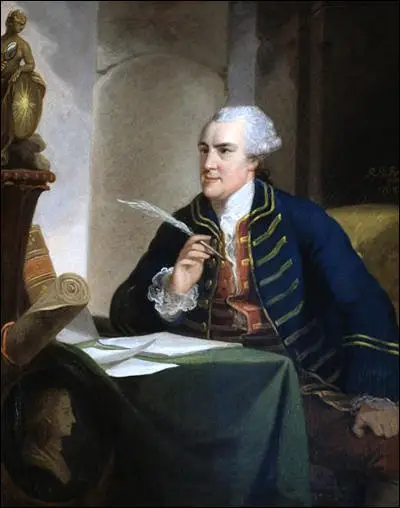
On this day in 1831 Dorothea Beale, the daughter of Miles Beale and Dorothea Complin, was born in London. Miles Beale, a surgeon, employed a governess for Dorothea and her ten brothers and sisters. At sixteen Dorothea was sent to a school in Paris for a year.
Dorothea became a student at Queen's College for Women when it first opened in 1848. Dorothea did so well that when she finished her studies they appointed her as their first woman mathematics tutor. However, Dorothea gradually became dissatisfied with the college and in 1856 became Head Teacher at Casterton School. Attempts to make changes to the way the school was organised ended in failure and she left within a year of being appointed.
For the next twelve months she concentrated on writing a Textbook of General History. This became a popular book with teachers and helped her to be appointed as Head Teacher of Cheltenham Ladies College. At the time the school had only a moderate reputation but under Beale's leadership it became one of the most highly regarded schools in the country. The traditional education of girls had emphasized the development of accomplishments such as music and drawing. Dorothea Beale, however, was determined to provide a much more academic education.
Dorothea used her success at Cheltenham Ladies College to demonstrate what a good school could achieve. Dorothea Beale was also involved in trying to improve the national standard of education and played a prominent role in the Head Mistresses' Association and The Teachers' Guild.
In 1865 Dorothea Beale joined with Emily Davies and Elizabeth Garrett and eight other women to form a discussion group called the Kensington Society. In 1867 the group drafted a petition asking Parliament to grant women the vote. One of their supporters, John Stuart Mill, added an amendment to the 1867 Reform Act that would give women the same political rights as men. However, the amendment was defeated by 196 votes to 73.
Members of the Kensington Society were very disappointed when they heard the news and decided to form the London Society for Women's Suffrage. Soon afterwards similar societies were formed in other large towns in Britain. Dorothea Beale eventually became vice-president of the Central Society for Women's Suffrage.
In 1892 Dorothea Beale purchased Cowley House in Oxford for £5,000. The following year, the building was opened as St. Hilda's College. In 1897 St. Hilda's was accepted by the Association for Promoting the Higher Education of Women as a high standard college for women.
Beale wrote several books about education including Work and Play in Girls' Schools (1898). Dorothea Beale continued as the principal of Cheltenham Ladies College until her death on 9th November 1906.
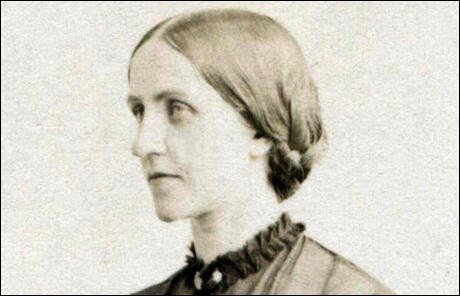
On this day in 1843 Robert Southey died. Robert Southey, the son of a linen draper, was born in Bristol in 1774. After his father's death an uncle sent him to Westminster School but he was expelled in 1792 after denouncing flogging in the school magazine.
In 1794 Southey met Samuel Taylor Coleridge in Bristol and the two men became close friends. They developed radical political and religious views and began making plans to emigrate to Pennsylvania where they intended to set up a commune based on communistic values. Southey and Coleridge eventually abandoned this plan and instead stayed in England where they concentrated on communicating their radical ideas. This included the play they wrote together, The Fall of Robespierre. Southey also wrote the republican play, Wat Tyler.
In 1795 Southey married Edith Fricker, whose elder sister, Sara Fricker, married Samuel Taylor Coleridge. That year saw the publication of his book Poems and the epic poem, Joan of Arc. Between 1796 and 1798 he wrote many ballads, including The Inchcape Rock and The Battle of Blenheim. Southey's poetry sold poorly and had to rely on the £160 a year allowance paid to him by his friend Charles Wynn.
Southey gradually lost his radical opinions and in 1807 he was rewarded by being granted an annual allowance by the Tory government. In 1809 Robert Southey joined the staff of the Quarterly Review established by John Murray in 1809 as a Tory rival to the Whig supporting Edinburgh Review. Other contributors included the Tory politicians George Canning, and the Marquis of Salisbury.
In 1813 Robert Southey was appointed poet laureate. Southey was criticised by Lord Byron and William Hazlitt who accused him of betraying his political principles for money. In 1821 Southey commemorated the death of George III with his poem A Vision of Judgement. This included an attack on Lord Byron who replied with The Vision of Judgement, one of the great satirical parodies of English literature.
Southey wrote several books including: The Book of the Church (1824), Sir Thomas More (1829), Essays Moral and Political (1832) and Lives of British Admirals (1833). In 1835 Sir Robert Peel, the British prime minister, increased Southey's pension to £300 a year. Robert Southey died in 1843.
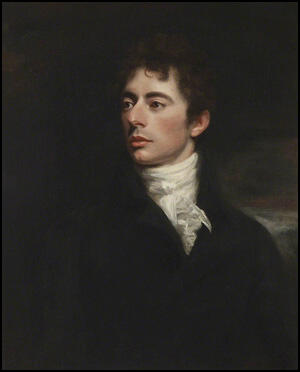
On this day in 1890 George Crook died of a heart attack in Chicago. George Crook was born on 23rd September, 1829, near Taylorville, Ohio. After being educated at West Point he was commissioned as a second lieutenant of the 4th Infantry. His first post was at Benicia Barracks in California. In 1853 he was moved to Fort Jones. Later he was sent to Fort Vancouver, Washington where he saw action against the Yakima. He also fought as a member of the Union Army during the American Civil War.
On 28th July, 1866, Crook was promoted to the rank of lieutenant colonel and was given command of the District of Boise in Idaho. Over the next five years Crook was involved in action against the Paiute. In one skirmish in September, 1867, eight of his men were killed at Pitt River.
Crook was given command of the Department of Arizona in June 1871. He was considered a great success in this difficult job and was promoted to the rank of Brigadier General. During this period he employed Al Sieber as his chief of scouts.
In 1875 Crook was appointed commander of the Department of Platte and over the next couple of years was involved in massive operations against the Sioux and Cheyenne. On 17th June 1876, Crook and about 1,000 troops, supported by 300 Crow and Shoshone, fought against 1,500 members of the Sioux and Cheyenne tribes. The battle at Rosebud Creek lasted for over six hours. This was the first time that Native Americans had united together to fight in such large numbers.
Crook was seen as America's most successful commander in the Indian Wars. As well as a good commander of his troops, Crook showed a genuine sympathy for the plight of the Native Americans. They recognised this and he was affectionately known as Chief Grey Wolf. In 1882 he was sent to Arizona to deal with the Apache. The following year he led the Sierra Madre Expedition in Mexico.
In May 1885, Geronimo went on the warpath. Crook tried to persuade the Apache leader to take part in peace negotiations. Crook was criticised for the way he was dealing with the situation and as a result he asked to be relieved of his command. General Nelson Miles replaced Crook and attempted to defeat Geronimo by military means. This strategy was also unsuccessful and eventually he resorting to Crook's strategy of offering a negotiated deal. In September 1886 Geronimo signed a peace treaty with Miles and the last of the Indian Wars was over. George Crook was promoted to the rank of Major General, and in April, 1888, was given command of the Division of Missouri.
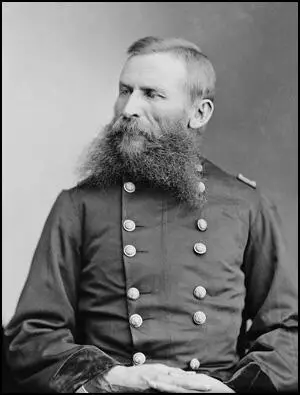
On this day in 1920 Evelina Haverfield died. Evelina Scarlett, the youngest daughter of William Frederick Scarlett, the 3rd Lord Arbinger, was was born at Inverlochy Castle on 9th August 1867.
Evelina married Major Henry Haverfield in 1887 when she was 19. He was 20 years her senior. They moved to Dorset and over the next few years she had two sons. Her husband died in 1895. She remarried another soldier, Major John Blaguy, in July 1899, but reassumed the name "Haverfield" by deed poll within a month of the marriage. An excellent horsewomen, she accompanied her new husband husband to South Africa when he fought in the Boer War.
An early member of the National Union of Suffrage Societies she joined the Women's Social and Political Union in March 1908. She later explained that she joined the WSPU after hearing Minnie Baldock speak at a public meeting. Sylvia Pankhurst recalled: "When she first joined the Suffragette movement her expression was cold and proud... I was repelled when she told me she felt no affection for her children."
Her marriage to Major John Blaguy was not a success. According to her biographer, Boyce Gaddes: "After about ten years of this tentative relationship, they apparently each went their own ways, legally married but permanently separated."
In 1909 Haverfield joined Annie Kenney, Mary Blathwayt and Elsie Howey to organise the women's suffrage campaign in the West Country. During this period she became honorary secretary of the Sherborne branch of the WSPU. She retained her membership of the NUWSS and in June 1909 took part in its caravan campaign with Isabella Ford and Ray Strachey.
On 29th June 1909 she was arrested with Emmeline Pankhurst during a demonstration outside the House of Commons. Although she was defended in court by Lord Robert Cecil she was found guilty and fined. The case went to appeal but was dismissed in December and the fine was upheld.
Evelina Haverfield, along with Vera Holme and Maud Joachim, was a mounted marshal for a WSPU procession on 22nd July 1910. On 18th November 1910, she was charged with assaulting a policeman by hitting him in the mouth. In court it was reported that Haverfield had said during the assault that she had not hit him hard enough and that "next time I will bring a revolver." She was sentenced to a fine or a month's imprisonment. She did not go to prison as her fine was paid without her consent. Three days later she was arrested for trying to break through a police cordon outside the House of Commons. This time she was sent to Holloway Prison for two weeks.
In 1910 Haverfield joined the Tax Resistance League. The following year she began living with Vera Holme. It has been argued by Rebecca Jennings, the author of A Lesbian History of Britain (2007), that Holme was a lesbian and the lover of Haverfield. This view is supported by Emily Hamer, the author of Britannia's Glory: A History of Twentieth-Century Lesbians (1996) who claims that the bed they shared was inscribed with their initials.
The summer of 1913 saw a further escalation of WSPU violence. In July attempts were made by suffragettes to burn down the houses of two members of the government who opposed women having the vote. These attempts failed but soon afterwards, a house being built for David Lloyd George, the Chancellor of the Exchequer, was badly damaged by suffragettes. This was followed by cricket pavilions, racecourse stands and golf clubhouses being set on fire.Some leaders of the WSPU such as Emmeline Pethick-Lawrence, disagreed with this arson campaign. When Pethick-Lawrence objected, she was expelled from the organisation. Others like Haverfield, Elizabeth Robins, Jane Brailsford and Louisa Garrett Anderson showed their disapproval by ceasing to be active in the WSPU and Hertha Ayrton, Janie Allan and Elizabeth Garrett Anderson stopped providing much needed funds for the organization.
In 1913, Sylvia Pankhurst, with the help of Haverfield, Keir Hardie, Julia Scurr, Millie Lansbury, Nellie Cressall and George Lansbury, established the East London Federation of Suffragettes (ELF). An organisation that combined socialism with a demand for women's suffrage it worked closely with the Independent Labour Party. Sylvia claimed that Haverfield had changed greatly over the last five years: "During her years in the Suffrage movement her sympathies so broadened that she seemed to have undergone a rebirth."
On the outbreak of the First World War, Haverfield supported the decision by Emmeline Pankhurst, to help Britain's war effort. In 1914 Haverfield founded the Women's Emergency Corps, an organisation which helped organize women to become doctors, nurses and motorcycle messengers. Christabel Marshall described Haverfield as looking "every inch a soldier in her khaki uniform, in spite of the short skirt which she had to wear over her well-cut riding-breeches in public."
Appointed as Commandant in Chief of the Women's Reserve Ambulance Corps, Haverfield was instructed to organize the sending of the Scottish Women's Hospital Units to Serbia. On 5th July, 1916, Elsie Bowerman wrote to her mother: "Mrs Haverfield has just asked me to go out to Serbia at the beginning of August, to drive a car - May I go? I know Miss Whitelaw would let me off Wycombe to go. It is what I've been dying to do & drive a car ever since the war started. I should have to spend the week after the procession learning to drive - the cars are Fords - if I went I would come home when I come back I would not have to go to W.A. It is really like a chance to go to the front. They want drivers so badly. So do say yes - It is too thrilling for words."
In August, 1916, Haverfield went with Dr. Else Inglis, Elsie Bowerman, Nina Boyle, Lilian Lenton and the Scottish Women's Hospital Units to Serbia. Haverfield's partner, Vera Holme, was commissioned as a major and was placed in charge of horses and trucks in the unit.
Haverfield was appointed head of the transport column and in August 1916 she was dispatched to Russia. Her biographer, Elizabeth Crawford, has commented: "Haverfield sailed for Russia, in charge of the unit's transport column, which comprised seventy-five women noted for their smart uniforms and shorn locks. She herself is invariably described as being small, neat, and aristocratic, able to command devotion from her troops, although some of her peers, not so enamoured, were scathing of her ability."
In March 1917 she left her post after a disagreement with Dr. Else Inglis. She later wrote: "I hope the Committee will realize that though Mrs. Haverfield and I differed over the plans for the future, there isn't a particle of ill-feeling between us. Mrs. Haverfield is as generous and open-minded and as ready to face facts as she always was. All we either of us care about is the success of the unit - and our ideas differ... The Committee must decide between us! - Anyhow they may be thoroughly proud of the work the Transport has accomplished."
With Flora Sandes she founded the Evelina Haverfield's and Flora Sandes' Fund for Promoting Comforts for Serbian Soldiers and Prisoners. After the armistice Haverfield founded an orphanage in Serbia and was working there when she contracted pneumonia and died on 21 March 1920 at Bajina Bašta, where she was buried. In her will she left Vera Holme £50 a year for life.
In March 1917 she left her post after a disagreement with Dr. Else Inglis. She later wrote: "I hope the Committee will realize that though Mrs. Haverfield and I differed over the plans for the future, there isn't a particle of ill-feeling between us. Mrs. Haverfield is as generous and open-minded and as ready to face facts as she always was. All we either of us care about is the success of the unit - and our ideas differ... The Committee must decide between us! - Anyhow they may be thoroughly proud of the work the Transport has accomplished."
With Flora Sandes she founded the Evelina Haverfield's and Flora Sandes' Fund for Promoting Comforts for Serbian Soldiers and Prisoners. After the armistice Haverfield founded an orphanage in Serbia and was working there when she contracted pneumonia and died on 21 March 1920 at Bajina Bašta, where she was buried. In her will she left Vera Holme £50 a year for life.
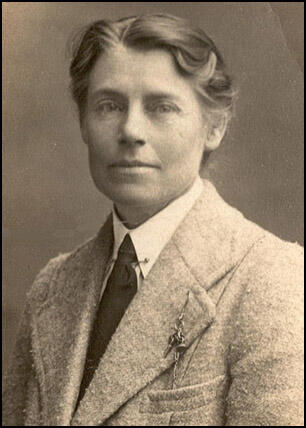
On this day in 1939 William Connor (Cassandra) criticised Neville Chamberlain and his appeasement policy in the Daily Mirror . He wrote: "There are two ways of losing a war. One is to be defeated in the field. The other is to lose the war before it begins. We have indicated this peril for months past. It is now obvious. It has to be admitted. Why is so plain a peril - plainly revealed in Hitler's book - why, we ask, is it only now recognised by our rulers? Simply because, even if they have read Hitler (which is still doubtful) they have not believed what he has said in Mein Kampf. Not believing him, not knowing the sort of lucid lunatic with whom they have had to deal, they have believed it possible to disarm him by smiles, handshakes, pacts and scraps of paper."
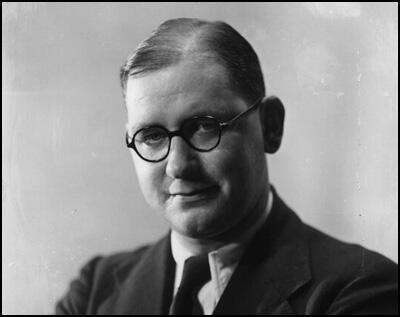
On this day in 1945 Francis Suttill was executed in Germany. Francis Suttill was born in Lille, Grance, in 1910. His father was British and his mother French. He was educated in Britain (Stonehurst College) and France (University of Lille).
Suttill worked as a barrister at Lincoln's Inn and on the outbreak of the Second World War he joined the British Army. Later he was recruited by the Special Operations Executive (SOE).
1942 the SOE decided to get Suttill to establish a new network called Prosper in and around Paris. On 24th September, 1942, Andrée Borrel was parachuted into France to prepare the way for Suttill who arrived on 1st October. A wireless operator, Gilbert Norman arrived in November and a second operator, Jack Agazarian, arrived the following month.
Suttill was impressed with Andrée Borrel and despite her young age in March 1943 became second in command of the network. He told the Special Operations Executive in London that she "has a perfect understanding of security and an imperturbable calmness."
On 22nd January 1943, Henri Déricourt, a former pilot in the French Air Force, arrived back in France. His main task was to find suitable landing grounds and organize receptions for agents brought by air. He worked mainly for the Prosper Network and over the next few months he arranged the transport by plane of over 67 agents.
Suttill and Jack Agazarian became increasing concerned about the loyalty of Henri Déricourt. In May 1943, Suttill returned to London and he passed on these fears to Nicholas Bodington and Maurice Buckmaster. However, they were unconvinced and refused to recall Déricourt to Britain.
On 12th June 1943, Suttill returned to France. On 23rd June, 1943, Suttill was arrested at the hotel he was staying at in the working-class district of Porte St. Denis. Andrée Borrel and Gilbert Norman were also arrested on the same day. When Noor Inayat Khan, who had just arrived as a wireless operator for Prosper, discovered that Suttill had been arrested, she reported back the disaster to the Special Operations Executive in London.
Suttill was taken to the Gestapo headquarters at 84 Avenue Foch. Suttill was tortured for several days and according to Ernest Vogt he eventually did a deal with the Germans. This included Suttill giving the Germans details of ammunition dumps in exchange for the promise that the people guarding them would not be killed. However, according to another German agent, Joseph Kieffer, it was Gilbert Norman who gave the Gestapo this information.
Some historians have questioned the truth of these allegations believing that Vogt and Kieffer were protecting the identity of the double agent, possibly Henri Déricourt, who gave them the information. Francis Suttill was executed on 21st March 1945.
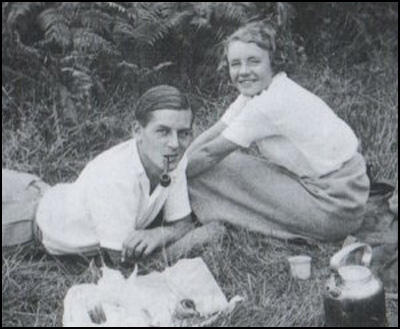
On this day in 1951 Larry Parks gave evidence to the House of Un-American Activities Committee. He admitted that he joined the American Communist Party in 1941. He joined because it "fulfilled certain needs of a young man that was liberal of thought, idealistic, who was for the underprivileged, the underdog". At first he refused to name other members of the party: "I would prefer not to mention names, if it is at all possible, of anyone. I don't think it is fair to people to do this. I have come to you at your request. I have come and willingly tell you about myself. I think that, if you would allow me, I would prefer not to be questioned about names. And I will tell you everything that I know about myself, because I feel I have done nothing wrong, and 1 will answer any question that you would like to put to me about myself. I would prefer, if you will allow me, not to mention other people's names.... The people at that time as I knew them-this is my opinion of them. This is my honest opinion: That these are people who did nothing wrong, people like myself.... And it seems to me that this is not the American way of doing things to force a man who is under oath and who has opened himself as wide as possible to this committee - and it hasn't been easy to do this -to force a man to do this is not American justice."
However, Parks did agree to name members in a private session of the HUAC. This included Joseph Bromberg, Lee J. Cobb, Morris Carnovsky, John Howard Lawson, Karen Morley, Anne Revere, Gale Sondergaard, Dorothy Tree, Roman Bohnan, Lloyd Gough and Victor Kilian. Three days later Paul Jarrico, who was due to appear before the HUAC, told the New York Times, that he was unwilling to follow the example of Parks: "If I have to choose between crawling in the mud with Larry Parks or going to jail like my courageous friends of the Hollywood Ten, I shall certainly choose the latter."
Despite giving the names of other former members of the Communist Party, Parks was still blacklisted. After failing to get work in Hollywood, Parks asked to appear before the House of Un-American Activities Committee again in an effort to provide more information about communism. He argued in a letter dated 15th July, 1953: "After careful consideration I wish to file a clarifying statement of my point of view on the Communist problem with your Committee. I am now convinced that my previous testimony improperly reflects my true attitude towards the malignancy of the Communist Party. If there is any way in which I can further aid in exposing the methods of entrapment and deceit through which Communist conspirators have gained the adherence of American idealists and liberals, I hope the Committee will advise me. Above all, I wish to make it clear that I support completely the objectives of the House Committee on Un-American Activities. I believe fully that Communists and Communist intrigues should be thoroughly exposed and isolated and thus rendered impotent."
Despite this appeal he failed to get his name removed from the blacklist but he did continue to perform on the stage and appeared in two long running plays, Teahouse of the August Moon and Any Wednesday and two Broadway shows. Larry Parks died of a heart attack on 13th April, 1975.

